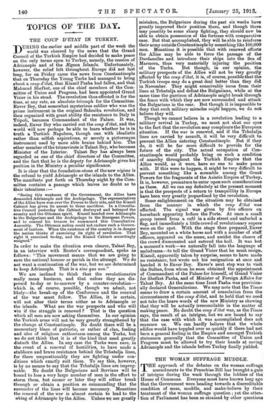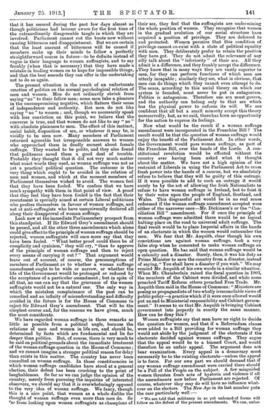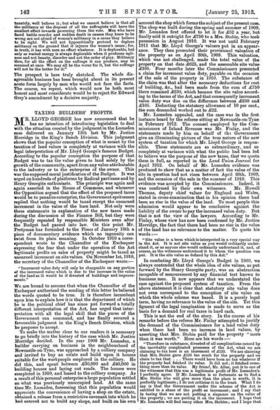THE WOMAN SUFFRAGE MUDDLE. T HE approach of the debates on
the woman suffrage amendments to the Franchise Bill has brought a gale of intrigue during the week through the lobbies of the. House of Commons. Everyone must have known long ago that the Government were heading towards a discreditable condition of mess, muddle, and make-believe by their treatment of the woman suffrage question ; yet the atten- tion of Parliament has been so strained by other questions that it has seemed during the past few days almost as though politicians had become aware for the first time of the extraordinarily disagreeable tangle in which they are involved. Parliament cannot cut the knots now without causing bitterness and disappointment. But we are certain that the least amount of bitterness will be caused if members make up their minds to follow a perfectly straightforward course in future—to be definite instead of vague in their language to women suffragists, and to say frankly (when that is necessary) that they have made a mistake in leading women on to hope for impossible things, and that the best amends they can offer is the undertaking not to do so again.
The present situation is the result of an unfortunate reaction of politics on the normal psychological relation of men and women. Men do not ordinarily shrink from saying "no" to their fellow men; some men take a pleasure in the uncompromising negative, which flatters their sense of independence and authority. But men do not like saying " no" to women ; and, though we necessarily speak with less conviction on this point, we believe that the converse is true, and that women do not like to say " no " with absolute plainness to men. The effect of this instinct, social habit, disposition of sex, or whatever it may be, is vividly to be seen uow. Many members of Parliament returned agreeable but irresponsible answers to women who approached them in deadly earnest about female suffrage. They wanted to be polite, and they also found that politeness saved them a good deal of trouble. Probably they thought that it did not very much matter what exact words they used, as woman suffrage was not as yet a practical political question. The outcome is the very thing which ought to be avoided in the relation of men and women, and which at the moment members of Parliament themselves wished to avoid. The women feel that they have been fooled. We confess that we have much sympathy with them in that point of view. A proof that they feel they have been fooled is the fact that their resentment is specially aimed at certain Liberal politicians who profess themselves in favour of woman suffrage, and not at anti-suffragists who have unequivocally declared all along their disapproval of woman suffrage. Look now at the immediate Parliamentary prospect from this standpoint. If Sir Edward Grey's amendment should be passed, and all the other three amendments which alone could give effect to the principle of woman suffrage should be rejected, women suffragists will once more say that they have been fooled. " What better proof could there be of complicity and cynicism," they will cry, " than to approve of the principle of woman suffrage and then to reject every means of carrying it out ? " That argument would leave out of account, of course, the preconceptions of members of Parliament as to whether a woman suffrage amendment ought to be wide or narrow, or whether the life of the Government would be prolonged or reduced by the acceptance of a particular amendment ; but in spite of all that, no one can say that the grievance of the women suffragists would not be a natural one. The only way in which the mistaken complaisance of the past can be remedied and an infinity of misunderstandi g and difficulty avoided in the future is for the House of Commons to reject Sir Edward Grey's amendment. That will be the simplest course and, for the reasons we have given, much the most considerate.
We have regarded woman suffrage in these remarks as little as possible from a political angle, because the relations of men and women in life are, and should be, determined by facts which are fundamental and lie far deeper than politics. But, of course, there is very much to be said on political grounds about the immediate treatment of the woman suffrage question in the House of Commons ; and we cannot imagine a stronger political reason for delay than exists in this matter. The country has never been consulted on woman suffrage. In those constituencies in which woman suffrage candidates have stood at a general election, their defeat has been crushing to the point of laughableness. So far as we can judge the opinion of the country, merely from pursuing the inquiries of interested observers, we should say that it is overwhelmingly opposed to the very idea of woman suffrage. We fancy, though this is a nice point, that women as a whole dislike the thought of woman suffrage even more than men do. So tar from looking upon women suffragists as champions of their sex, they feel that the suffragists are undermining the whole position of women. They recognize that women in the gradual evolution of our social structure have acquired a position of privilege. They are deferred to and protected. Women perceive that this condition of privilege cannot co-exist with a state of political equality with men. They deliberately prefer to retain the position they have got. They do not admit the relevance of any silly talk about the " inferiority " of their sex. All they admit is a difference, and they frankly accept the difference. .They know that in many ways they are vastly superior to men, for they can perform functions of which men are utterly incapable ; similarly they see, what is obvious, that men can do things which they cannot even attempt to do. The sexes, according to this social theory on which our system is founded, must never be put in antagonism. Politics is antagonism. Therefore one sex must govern, and the authority can belong only to that sex which has the physical power to enforce its will. We are confident that all but a small minority accept this theory unreservedly, but, as we said, there has been no opportunity for the nation to express its feelings.
Now what would be the result if a woman suffrage amendment were incorporated in the Franchise Bill ? The result would be that the question of woman suffrage would enjoy the benefit of the Parliament Act. In other words, the Government would pass woman suffrage, as part of the Franchise Bill, over the heads of the Lords. A con- stitutional revolution would be effected without the country ever having been asked what it thought about the matter. We have not a high opinion of the restraint of Liberals in using the Parliament Act to cram fresh power into the hands of a caucus, but we absolutely refuse to believe that they will be guilty of this outrage. If it were possible to add to such an outrage it would surely be by the act of allowing the Irish Nationalists to refuse to have woman suffrage in Ireland, but to foist it by their votes upon the people of England, Scotland, and Wales. This disgraceful act would be in no real sense redeemed if the woman suffrage amendment accepted wore either of the narrower ones—Mr. Dickinson's or the " Con- ciliation Bill " amendment. For if once the principle of woman suffrage were admitted there would be no logical halting-place on the road to universal adult suffrage. The final result would be to place Imperial affairs in the hands of an electorate in which the women would outnumber the men. We fear that Mr. Asquith, clear though his own convictions are against woman suffrage, took a very false step when he consented to make woman suffrage an open question. He has said that woman suffrage would be a calamity and a disaster. Surely, then, it was his duty as Prime Minister to save the country from a disaster, instead of saying, "You shall have a disaster if you wish." We may remind Mr. Asquith of his own words in a similar situation. When Mr. Chamberlain raised the fiscal question in 1903, the members of the Cabinet were divided, and while some preached Tariff Reform others preached Free Trade. Mr. Asquith then said in the House of Commons : " Ministers are posing as propagandists of two wholly irreconcilable views of public policy—a practice which if it were once allowed would put an end to Ministerial responsibility and Cabinet govern- ment." It seems to us that Mr. Asquith is bringing Cabinet government into jeopardy in exactly the same manner. How can he deny this ?
Women suffragists say that men have no right to decide the question for women, and that if a Referendum clause were added to a Bill providing for woman suffrage they would not abide by the judgment of the electorate if the electorate decided against woman suffrage. They argue that the appeal would be to a biassed Court, and would therefore be an unfair appeal. The argument does not bear examination. Every appeal in a democracy must necessarily be to the existing electorate—unless the appeal is to force. For our own part we should demand that if any woman suffrage amendment were carried there should be a Poll of the People on the subject. A few misguided women threaten fresh acts of hysteria and violence if all the amendments now before Parliament are rejected. Of course, whatever they may do will have no influence what- ever on the electors. The New Age in its last number puts the case particularly well :— " We are told that militancy in as yet unheard-of forms will follow on the defeat of the present amendments. We can, unfor- tunately, well believe it ; but what we cannot believe is that all the militancy at the disposal of all the suffragists will have the smallest effect towards procuring them the vote. Men who have faced battle murder and sudden death in causes they knew to be wrong are not afraid of women's militancy in a cause they believe to be right. We will not hypocritically pretend to deplore militancy on the ground that it injures the women's cause ; for, in truth, it has with men no effect whatever. It is deplorable, but only as wasted energy is always deplorable when it produces ugli- ness and not beauty, disorder and not the order of play. Militancy then, for all the effect on the suffrage it can produce, may be resumed at once. We may all be the worse for it, but the suffrage will not be the better for it."
The prospect is here truly sketched. The whole dis- agreeable business has been brought about in its present acute form largely by men who would not face the facts. The course, we repeat, which would now be both most honest and most considerate would be to reject Sir Edward Grey's amendment by a decisive majority.




























































 Previous page
Previous page